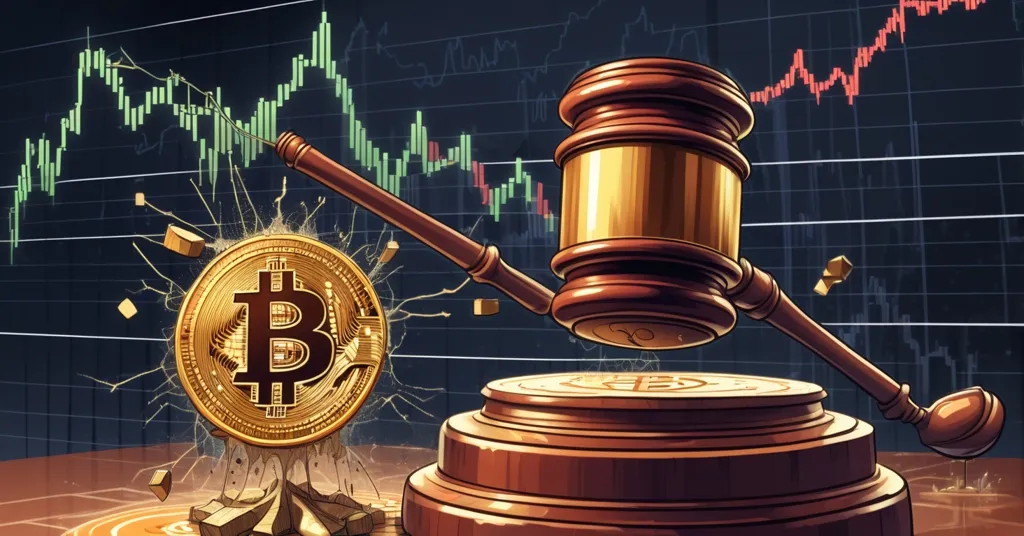New York Court Halts Genius Group’s Stock Trading and Forces Bitcoin Sale Amid Fraud Claims

New York Court Blocks Genius Group’s Stock Trading and Bitcoin Holdings Amid Fraud Allegations
A New York court’s ruling has halted Genius Group’s stock trading and forced the company to liquidate parts of its Bitcoin treasury amid fraud allegations.
- New York court bans Genius Group from trading stocks and holding Bitcoin
- Legal dispute with Fatbrain AI over fraud allegations
- Genius Group forced to sell 10 BTC from its treasury
- Company’s market cap drops below Bitcoin holdings value
The Court Ruling
On March 13, 2025, a New York court issued a preliminary injunction that put a sudden halt to Genius Group’s ability to trade stocks, raise funds, or buy Bitcoin. This court order, a type of legal directive that stops certain actions, came as a shock to many, including Genius Group’s CEO Roger James Hamilton, who remarked, “We never dreamed that a U.S. court could block the company from issuing shares, raising funds, or buying Bitcoin—decisions that should be made by shareholders or the board, not the courts.” The ruling followed a temporary restraining order (TRO) granted on February 14, 2025, which is a short-term measure often used to maintain the status quo during legal proceedings.
The Legal Dispute
The turmoil stems from a legal battle with Fatbrain AI and its shareholders, who have accused Genius Group’s executives, Michael Moe and Peter Ritz, of fraud. The conflict began when Genius Group sought to terminate an asset purchase agreement (APA) with Fatbrain AI, leading to a series of legal actions. The allegations of fraud have not only affected Genius Group’s market value but also forced it to sell 10 BTC out of its 440 BTC treasury. This left the company with 430 BTC, demonstrating the real-world implications of legal disputes on companies embracing Bitcoin.
Genius Group’s Response
In response to the court’s ruling, Genius Group has taken decisive action. The company has filed an emergency appeal with the United States Court of Appeals for the Second Circuit, hoping to overturn the injunction and restore its financial flexibility. CEO Roger James Hamilton remains steadfast in his belief in Bitcoin, stating,
“We will continue to fly the flag for Bitcoin, even when legally banned from building our Bitcoin Treasury.”
Additionally, the company has initiated a restructuring effort to conserve resources and navigate the legal quagmire, which includes downsizing various divisions and canceling all event sponsorships and marketing activities.
Financial Impact
The impact on Genius Group’s finances has been significant. Since the TRO in February, the company’s stock price has plummeted by 53%, dropping from $0.47 to $0.22. This has reduced Genius Group’s market capitalization to $33.1 million, which is ironically lower than the value of its remaining Bitcoin holdings. For a company that prides itself on its Bitcoin-first strategy, this is a bitter pill to swallow, and it highlights the vulnerability of such approaches to regulatory and legal challenges.
Broader Implications
The Genius Group case serves as a stark reminder of the challenges faced by companies that adopt Bitcoin as a significant part of their treasury. It underscores the tension between decentralized financial strategies and centralized legal systems, a tension that becomes increasingly evident as more companies embrace cryptocurrencies. As Hamilton puts it, “Bitcoin is about transparency and preventing fraud, yet here we are, legally banned from holding it.” This raises broader questions about the viability of Bitcoin-first treasury strategies in the face of regulatory challenges. While some may see this as a setback, others might argue it’s a wake-up call for companies to diversify their reserves to mitigate such risks.
The case also highlights the complexities of cross-jurisdictional legal conflicts. Genius Group, based in Singapore, faces difficulties in complying with local employment laws due to the U.S. court’s injunction, which prevents it from issuing share-based compensation. This illustrates the potential for legal and operational conflicts when companies operate across different countries.
From a broader perspective, this case is a sobering reminder of the hurdles that still need to be overcome in the journey towards a more decentralized financial future. It’s a reminder that while Bitcoin and other cryptocurrencies offer a vision of a world where financial power is distributed more evenly, the reality is often more complex and fraught with legal and regulatory challenges.
Key Questions and Takeaways
What was the impact of the New York court’s ruling on Genius Group’s operations?
The ruling forced Genius Group to liquidate parts of its Bitcoin treasury, prevented it from raising funds or buying Bitcoin, and led to a significant drop in its stock price and market capitalization.
Why did the court issue the injunction against Genius Group?
The injunction was issued due to ongoing legal disputes with Fatbrain AI and its shareholders, who alleged fraud against Genius Group’s executives.
How has Genius Group responded to the court’s ruling?
The company has filed an emergency appeal to overturn the injunction, restructured operations to conserve resources, and continues to publicly support Bitcoin.
What are the broader implications of this case for companies with Bitcoin-first treasury strategies?
It highlights the vulnerability of such strategies to regulatory and legal challenges, potentially prompting companies to diversify their reserves to mitigate similar risks.
What does this case reveal about the relationship between decentralized finance and centralized legal systems?
It illustrates the ongoing tension and potential for conflict between the two, where centralized legal actions can significantly disrupt decentralized financial strategies.



